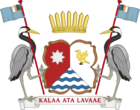Maaita of Freice
| President of the Republic of Freice | |
|---|---|
| Má’ita Fése Tehua á’i e Háma (Freician) | |
 Presidential Standard | |
Incumbent Kána Talá'akel since 30 January 2022 | |
| Style | Honourable President (within Freice) His Excellency (outside Freice) |
| Appointer | Parliament |
| Term length | At Parliament's pleasure; elected at the beginning of the new Parliament by a majority of members, and upon a vacancy during a Parliament. |
| Constituting instrument | Constitution of Freice |
| Precursor | King of Freice |
| Inaugural holder | Fápa Kiá'mira |
| Formation | 3 April 1921 |
| Salary | Pe. 845,940 (36,780 ACU annually) |
 |
|---|
| This article is part of a series on the politics and government of Freice |
|
The president of Freice, officially titled the President of the Country of Freice (Freician: Fése Tehua Má’ita) is the head of state and head of government of Freice. Members of Parliament elect the president from amongst their own ranks, doing so at the beginning of each Parliament. The president serves only as long as the lifetime of the Parliament in which they were elected (a maximum of two years) and ceases to be president upon the dissolution of that Parliament.
The presidency was established in the 1921 Constitution. Initially a largely ceremonial position but, constitutional revisions in 1951 and 1969 established a presidential system. The constitution grants the president the ability to appoint and dismiss public officials, including the prime minister, ministers and justices of the high court.
The current president is Kána Talá'akel, since 30 January 2022.
Eligibility
According to the Constitution of the Republic of Freice, only a born citizen of Freice who is a Member of Parliament and who is "of good and sound character" may be eligible for election to the presidency. There are no term limits and a president may be re-elected by a new Parliament providing that they continue to meet the criteria as established. The Presidency (Eligility) Act 2009 as further qualifications, requiring a president to renounce any position within Parliament (e.g., Speaker) and membership of any representative body of local self-government.